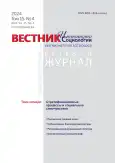Development of the Information and Network Environment and Deviant Behaviour: Cybercrime as a New Social Threat
- Авторлар: Pozdnyakova M.E.1, Bruno V.V.1
-
Мекемелер:
- Institute of Sociology of FCTAS RAS
- Шығарылым: Том 15, № 4 (2024)
- Беттер: 235-254
- Бөлім: Risks of social metamorphosis
- URL: https://journal-vniispk.ru/2221-1616/article/view/278557
- DOI: https://doi.org/10.19181/vis.2024.15.4.12
- EDN: https://elibrary.ru/HOJENA
- ID: 278557
Дәйексөз келтіру
Толық мәтін
Аннотация
For the empirical basis of the study the data of an online survey of the urban working-age population (18-60 years old), conducted by employees of the Sector of Sociology of Deviant Behaviour of the Institute of Sociology of FCTAS RAS using a multi-stage quota sample (March-May 2024) is used. The attitude of city residents to various types of digital crime was assessed. It was found that many respondents consider the probability of becoming a victim of cyber fraud to be high, especially with regard to the illegal use of personal data and hacking of email.
It was found that the number of respondents who fear becoming a victim of cyber-crime increases with age. At the same time, these fears decrease in the oldest age groups. The level of education is also an important differentiating factor in relation to encountering cyber threats - the higher its level, the more often respondents have experience of encountering cyber crime.
A survey of experts was conducted to identify the key features of cyber-crime in Russia. Specialists from various fields were involved in the examination - from deviant researchers to practitioners involved in information security and with experience in working with cyber-crime. Their forecast for the coming years is disappointing - a further increase in cyber-crime is expected, the complexity of the techniques used, including the use of artificial intelligence, and therefore the development of specialised security solutions is necessary. It is shown that the main factors in the growth of cybercrime in Russia are its dual nature, manifested in simultaneous organisational complexity and structure, on the one hand, and flexibility and adaptability, on the other. In addition, cybercrime exacerbates an important social problem - growing digital inequality. Thus, cyber-crime in Russia poses a serious threat that requires a comprehensive approach and coordinated efforts at all levels of society to effectively suppress it.
Авторлар туралы
Margarita Pozdnyakova
Institute of Sociology of FCTAS RAS
Email: margo417@isras.ru
ORCID iD: 0000-0002-7896-5115
SPIN-код: 6236-8782
ResearcherId: ABD-9844-2020
Candidate of Philosophical Sciences, Leading Researcher, Institute of Sociology of FCTAS RAS Moscow, Russia
Viktoria Bruno
Institute of Sociology of FCTAS RAS
Email: victoria.bruno@mail.ru
ORCID iD: 0000-0001-9735-024X
SPIN-код: 3191-0120
ResearcherId: ABD-9883-2020
Candidate of Sociological Sciences, Senior Research Fellow, Institute of Sociology of FCTAS RAS Moscow, Russia
Әдебиет тізімі
- Аносов А. В. Современные тенденции развития цифровой криминологии // Академическая мысль. 2021. № 4(17). С. 56–59. EDN: RYTJNP.
- Витвицкая С. С., Витвицкий А. А., Исакова Ю. И. Киберпреступления: понятие, классификация, международное противодействие // Правовой порядок и правовые ценности. 2023. Т. 1. № 1. С. 18–27. doi: 10.23947/2949-1843-2023-1-1-126-136; EDN: OKGPLW.
- Гребеньков А. А. Понятие информационных преступлений, место в уголовном законодательстве России и место признаков информации в структуре их состава // Lex Russica (Русский закон). 2018. № 4(137). С. 108–120. doi: 10.17803/1729-5920.2018.137.4.108-120; EDN: XMJNCX.
- Евдокимов К. Н. Противодействие компьютерной преступности: теория, законодательство, практика: дис. … д. юр. н. М.: Ун-т прок-ры РФ, 2022. 557 с.
- Каримов А. М. Преступления в сфере компьютерной информации и преступления, совершаемые с использованием информационно-коммуникационных технологий: сравнительно-правовой аспект // Вестник КЮИ МВД России. 2023. Т. 14. № 1(51). С. 75–82. doi: 10.37973/KUI.2023.93.91.010; EDN: HZGCMZ.
- Кибакин М. В. Актуальные проблемы рефлексии цифровой социальной реальности: переосмысление научных концепций // Цифровая социология. 2019. Т. 2. № 1. С. 4–9. doi: 10.26425/2658-347X-2019-1-4-9; EDN: QODQXM.
- Комлев Ю. Ю. Девиантность и преступность в эпоху high-tech, консьюмеризма и глэм-капитализма // Вестник КЮИ МВД России. 2018. № 1(31). С. 23–34. doi: 10.24420/KUI.2018.31.11105; EDN: QMUQSH.
- Комлев Ю. Ю. От цифровизации социума к киберпреступности, кибердевиантности и развитию цифровой девиантологии // Российский девиантологический журнал. 2022. №2 (1) С. 17–26. doi: 10.35750/2713-0622-2022-1-17-26; EDN: CLLGON.
- Коробеев А. И., Дремлюга Р. И., Кучина Я. О. Киберпреступность в Российской Федерации: криминологический и уголовно-правовой анализ ситуации // Всероссийский криминологический журнал. 2019. Т. 13. № 3. С. 416–425. doi: 10.17150/2500-4255.2019.13(3).416-425; EDN: XBLGEH.
- Крылова Ю. В. Компьютерная преступность: новые вызовы обществу // ЭКО. 2006. № 11(389). С. 174–179. EDN: HVNOKT.
- Ницевич В. Ф. Цифровая социология: теоретико-методологические истоки и основания // Цифровая социология. 2018. Т. 1. № 1. С. 18–28. doi: 10.26425/2658-347X-2018-1-18-28; EDN: YSZPRR.
- Номоконов В. А., Тропина Т. Л. Киберпреступность как новая криминальная угроза // Криминология: вчера, сегодня, завтра. 2012. № 1(24). С. 45–55. EDN: OYYFEN.
- Сергеев А. Ю., Широкова О. В. Мошенничество в цифровом обществе в условиях социальных изменений // Цифровая социология. 2023. Т. 6. № 1. С. 59–71. doi: 10.26425/2658-347X-2023-6-1-59-71; EDN: GPOMJX.
- Швыряев П. С. Киберпреступность как социальная проблема: стратегии противодействия: дис. … к. социол. н. М.: МГУ им. М. В. Ломоносова, 2024. 189 с.
- Kryshtanovskaya O. V., Chernavin Y. A., Lavrov I. A. Digital Generation: Mechanisms of Socialization and Social Prospects // Lecture Notes in Networks and Systems. 2022. Vol. 398 LNNS. P. 346–354. doi: 10.1007/978-3-030-94870-2_44; EDN: UOABEN.
Қосымша файлдар









